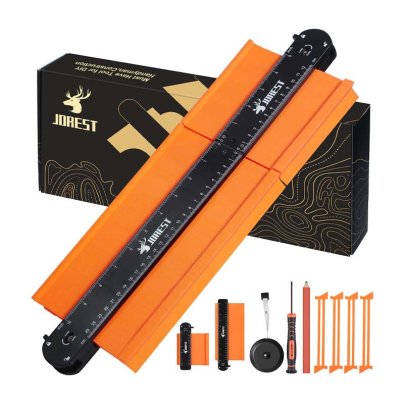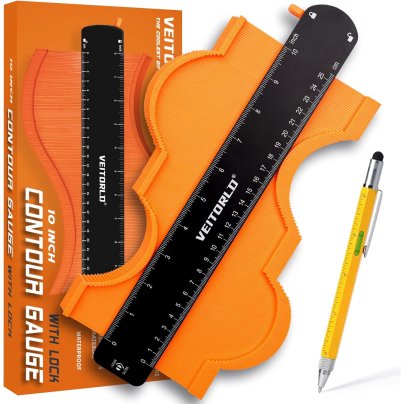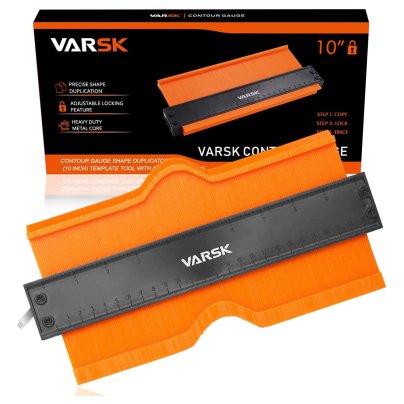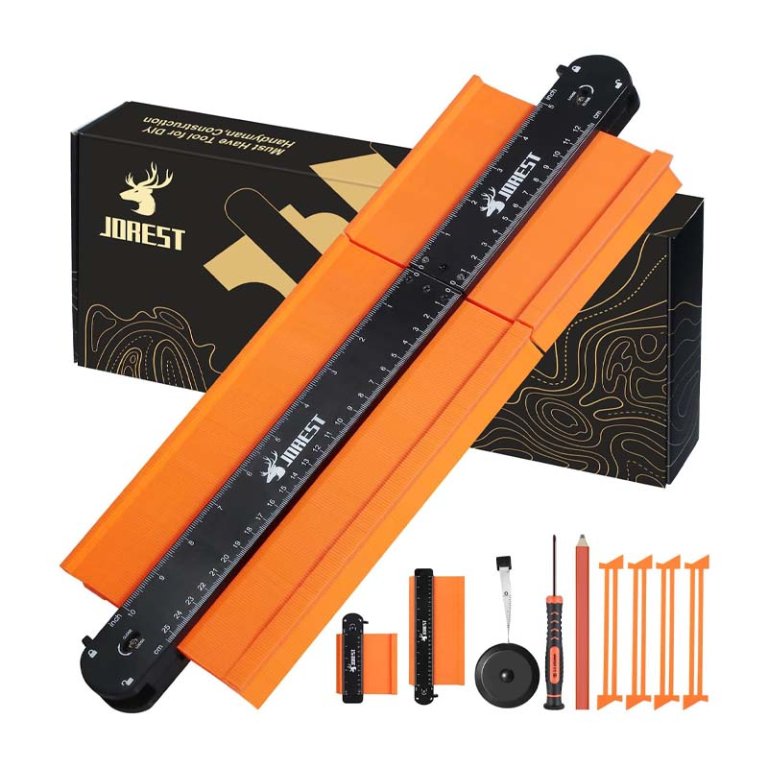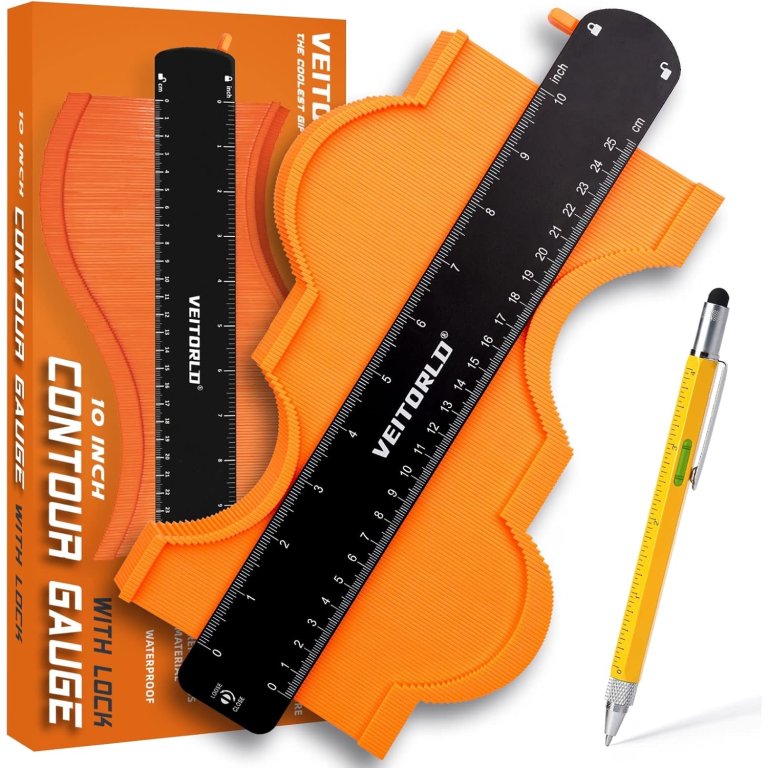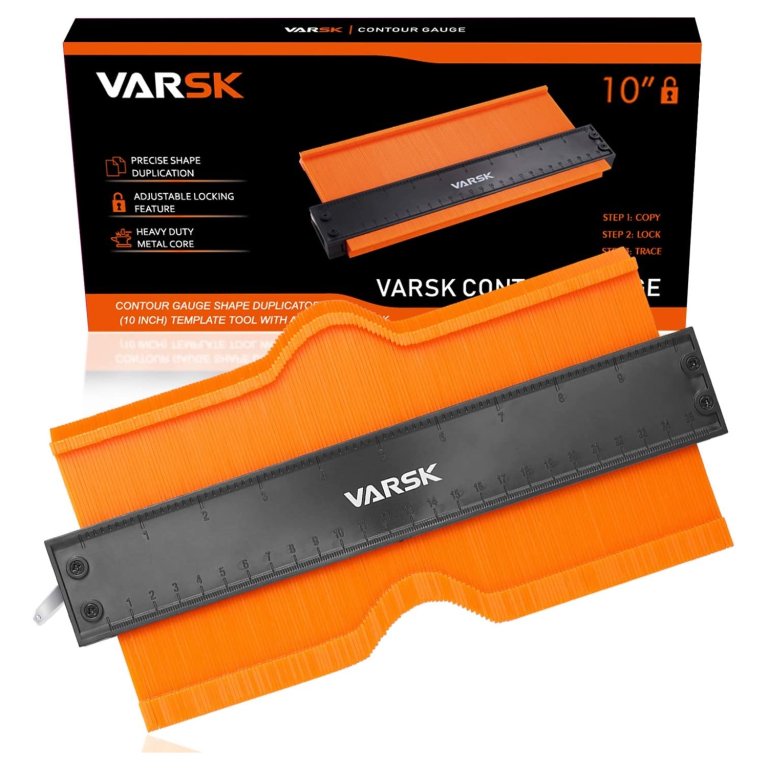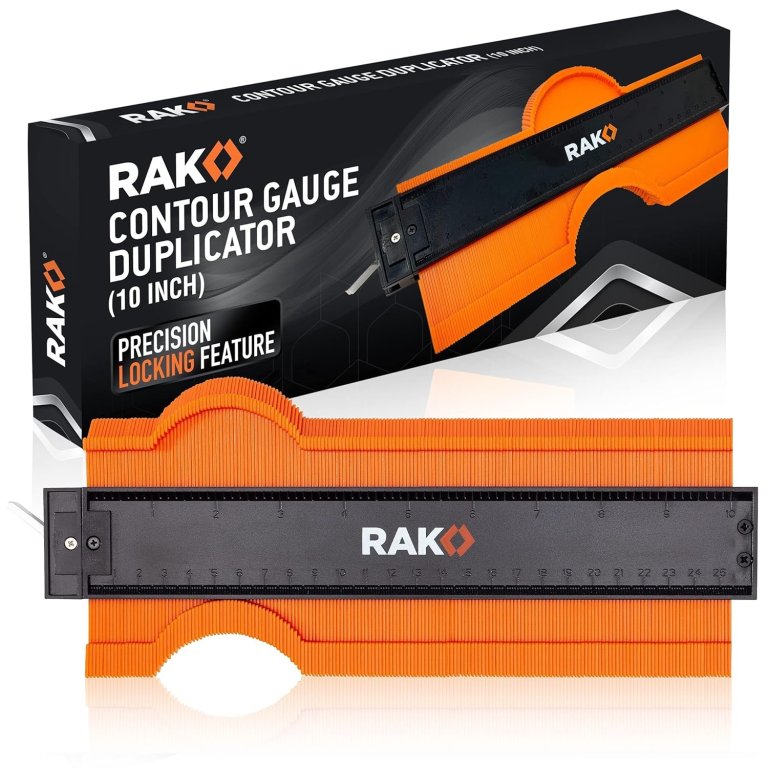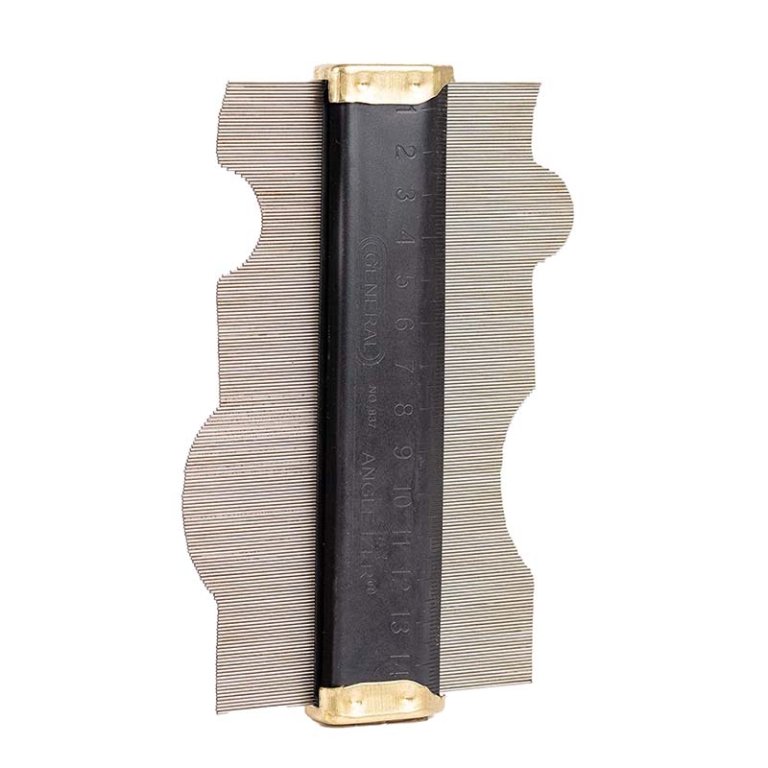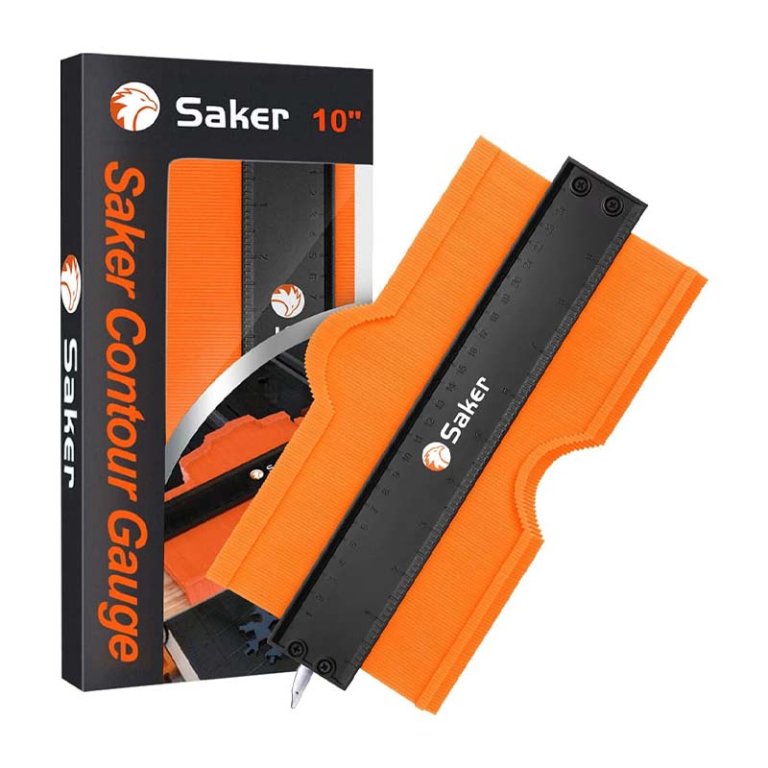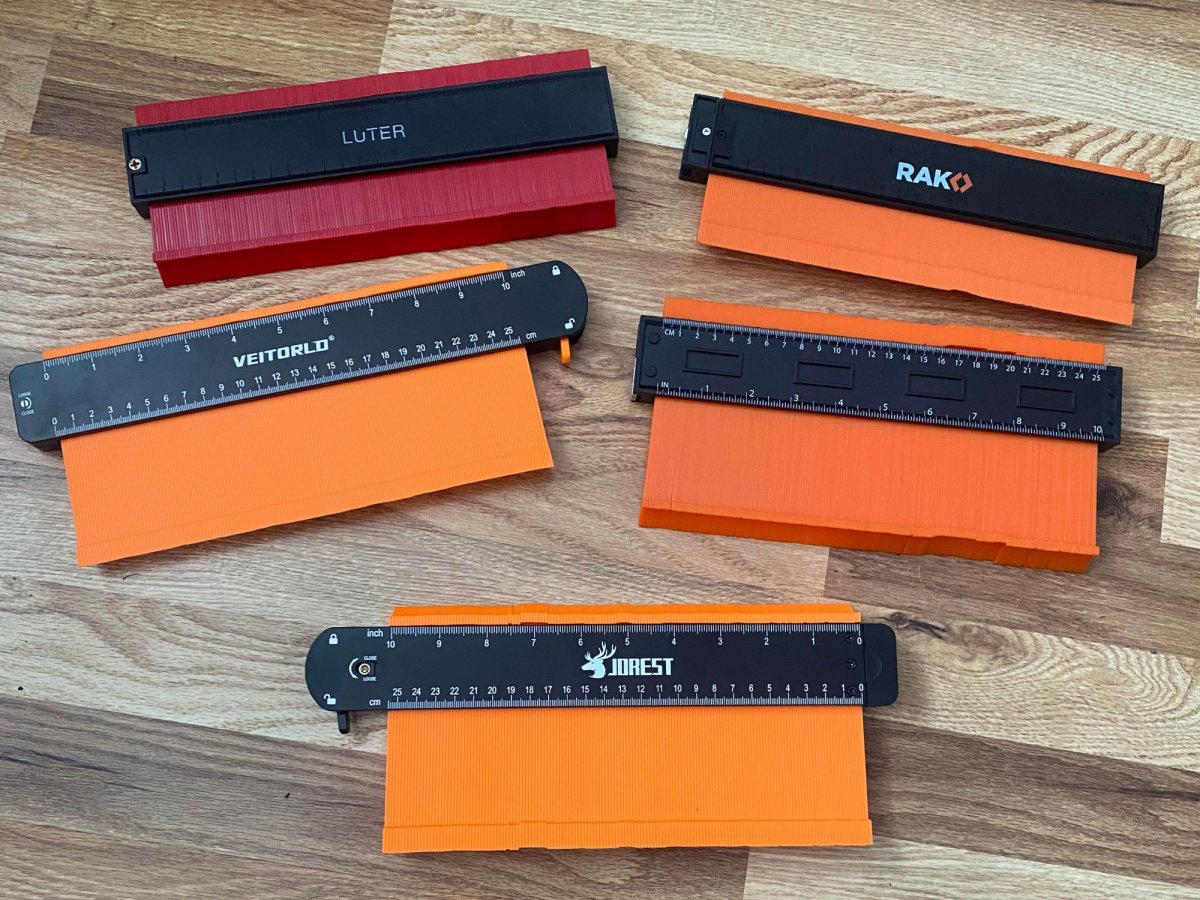
We may earn revenue from the products available on this page and participate in affiliate programs. Learn More ›
Contour gauges are simple but invaluable tools that resemble a comb with a long row of thin pins. When pushed against an object, the pins conform to the object’s shape, creating a mold that can be used to trace cutlines on flooring, tile, and other material.
We tested five different contour gauge tools to see how they’d perform in real-world applications. Our favorite is the Jorest Connectable Contour Gauge due to its durable construction, accuracy, and easy-to-see measurements, which make creating any shape a breeze. The following list includes some of the best contour gauges on the market.
- BEST OVERALL: Jorest Connectable Contour Gauge
↓ Jump to Review - RUNNER-UP: Veitorld Contour Gauge Profile Tool
↓ Jump to Review - BEST BANG FOR THE BUCK: Varsk Contour Gauge Tool
↓ Jump to Review - BEST FOR WEEKEND WARRIOR: Luter 10-Inch Profile Contour Gauge
↓ Jump to Review - HONORABLE MENTION: RAK Contour Gauge
↓ Jump to Review - BEST WITH METAL PINS: General Tools 837 Angle-Izer Contour Gauge
↓ Jump to Review - ALSO CONSIDER: Saker Contour Gauge
↓ Jump to Review
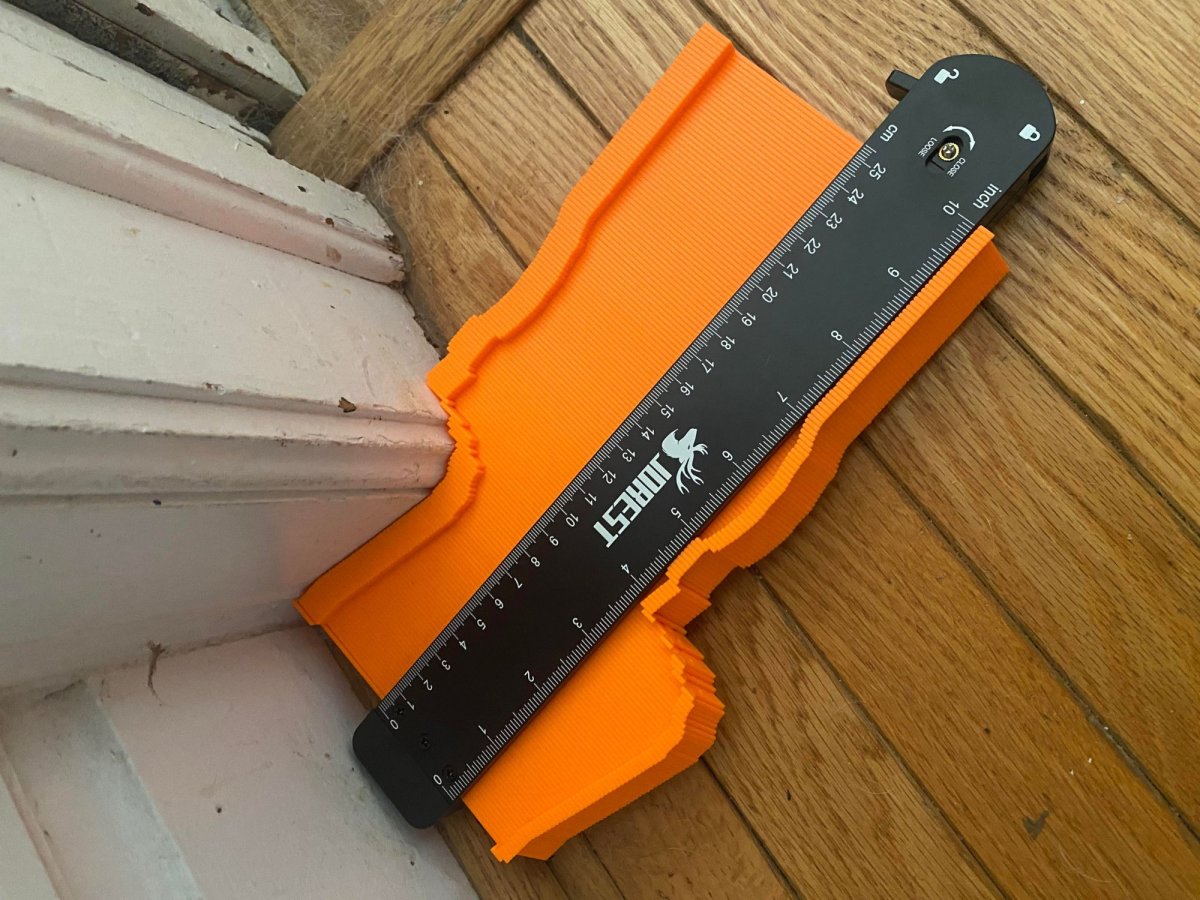
| Testing Stats | |
|---|---|
| Products tested | 5 |
| Time spent testing | 2.5 hours |
| Tests performed | 4 to 5 |
| Price range | $5 to $25 |
Our Top Picks
The following contour gauges are among the top picks on the market. These gauges are made with durable materials and create high-resolution duplications. Some offer additional helpful features, such as locking mechanisms and tension adjusters, and one of them is likely to be ideal for your needs.
Best Overall
Jorest Connectable Contour Gauge
What We Like
- Magnetic ends allow product to be extended
- Contrasting measurement marks are easy to see
- Locking mechanism works well
What We Don’t Like
- Getting pin tension just right takes time and adjustment
Product Specs
- Length: Up to 15 inches
- Contouring depth: 2.75 inches
- Material: ABS plastic, aluminum
Our Ratings: Accuracy 5/5; Pin Security 4.5/5; Durability 4/5; Value 4.7/5
The Jorest connectable contour gauge is a versatile tool and our choice as the best overall. It’s a solid tool box essential for both DIYers and professionals, and the ability to extend it from 10 inches to 15 inches is a useful feature.
Simple plastic and metal construction, as well as easily sliding pins, make for an extremely accurate and very easy-to-use gauge. In our testing, we found that the Jorest supergauge was able to tackle tricky obstacles like tiered baseboards with ease, as well as more straightforward angles and curves. Add in the very efficient lock, and this is a product that rises to the top of the list. As an added bonus, Jorest includes several replacement pins in case any get damaged.
Although the Jorest is on the higher side in price for the products we tested, its quality does fall in line with its price tag. Our only real complaint about the product is that it can be tricky to get the pin tension just right. The tension is adjusted with a small Phillips-head screwdriver (included) and a screw on one end.
What our tester says: “One feature that stood out to me is that the measurements are a contrasting color to the face of the gauge, making them easy to see.”—Mike Larson, Product Reviews tester & writer
Get the Jorest contour gauge at Amazon.
Runner-Up
Veitorld Contour Gauge Profile Tool
What We Like
- Locking mechanism works very well
- Contrasting print on ruler makes reading measurements easy
- Accurate results
What We Don’t Like
- Tension screw starts to loosen on its own after use
Product Specs
- Length: 10 inches
- Contouring depth: 2.5 inches
- Material: ABS plastic
Our Ratings: Accuracy 5/5; Pin Security 5/5; Durability 4/5; Value 4.3/5
With its easily moving teeth and durable locking mechanism, this contour gauge from Veitorld allows users to duplicate pipes, trim, car panels, and other irregularly shaped objects. It features high-grade plastic construction with a metal-locking mechanism at its core.
Each pin on the Veitorld contour gauge is just 0.05 inch wide, allowing for extremely accurate results. A tensioning system, controlled by a Phillips-head screw on one end of the gauge, allows users to fine-tune how much tension it takes to move and hold the pins. A metal lock holds the pins firmly in place after an object has been contoured, allowing users to trace it easily onto whatever material they are working with. The Veitorld contour gauge offers up to 2.5 inches of contouring width, making it a great option for trim and molding, and the core features a double-sided ruler with standard and metric measurements.
We only had one issue with this particular gauge. After we’d taken several different measurements while testing, the tension screw started to loosen on its own, requiring a manual retightening.
Get the Veitorld contour gauge at Amazon.
Best Bang For The Buck
Varsk Contour Gauge Duplicator
What We Like
- Works great on deeper shapes
- Easy to use
- Great product for the price
What We Don’t Like
- Tension needs to be set with small Allen wrench
- Measurements can be difficult to see
Product Specs
- Length: 10 inches
- Contouring depth: 2.5 inches
- Material: ABS plastic with metal lock
Our Ratings: Accuracy 4/5; Pin Security 3.5/5; Durability 4/5; Value 4.7/5
If you’re looking for a contour gauge that is capable but won’t bust your budget, the Varsk contour gauge is a great choice. While somewhat basic (and let’s face it, all of the contour gauges on the market are relatively simple tools), the Varsk does the job well and can be purchased for less than $15. It really is the perfect choice for someone who is tackling a job and just needs a cheap contour gauge to be able to get it done.
The Varsk has all the features of the high-end gauges. Pin movement is smooth, with each 0.05- inch pin sliding seamlessly to accurately trace even the most awkward shapes. A metal locking mechanism holds everything in place, and it even includes a tension adjuster.
We have only a couple of small complaints: The measurement numbers are the same color as the gauge, making them difficult to see in certain lights, and the tension can only be adjusted with a small Allen wrench (included). While the tension adjuster was more effective at staying tight than some of the other gauges we tested, we don’t love the idea of having to keep track of a tiny Allen wrench.
Get the Varsk contour gauge at Amazon.
Best For Weekend Warrior
Luter 10-Inch Profile Contour Gauge
What We Like
- Smooth pin movement
- Durable construction
What We Don’t Like
- No locking mechanism
Product Specs
- Length: 10 inches
- Contouring depth: 2.5 inches
- Material: ABS plastic with metal core
Our Ratings: Accuracy 3/5; Pin Security 2.5/5; Durability 5/5; Value 4/5
The Luter 10-inch profile contour gauge is a good choice for anyone looking for this type of tool and who isn’t going to use it everyday. It’s a nice choice to have in the tool box for when you need it from time to time. Its durability is impressive. An unintended challenge for the product during testing included being dropped accidentally from the top of a 15-foot ladder while getting a soffit measurement. Despite the fall and landing on the concrete below, the Luter took no more damage than a little scuff. The pins still moved smoothly and gave accurate readings on most angles. Accuracy suffers a bit in wider curves, but this is still a solid choice for a DIYer looking to have a contour gauge on hand for less than $20.
This 10-inch-long gauge features razor-thin 0.05-inch-wide teeth that provide high-resolution contouring. The gauge is 4 inches wide with a contouring depth of about 2.5 inches, and features measurements in both metric and Society of Automotive Engineers (SAE).
The main drawback of the Luter is that there is no way to lock the pins in place. Admittedly, we found the pins stay in place on their own very well, but any drop (like, say, from a 15-foot ladder) will require a remeasurement. Overall though, this is a great contour gauge for someone who wants to make sure they have a quality gauge at a solid price in their tool kit.
Get the Luter contour gauge at Amazon.
Honorable Mention
RAK Contour Gauge
What We Like
- Easy and straightforward to use
- Good price
- Strong locking mechanism
What We Don’t Like
- Measurements are difficult to see
Product Specs
- Length: 10 inches
- Contouring depth: 2.5 inches
- Material: ABS plastic, aluminum core
Our Ratings: Accuracy 4/5; Pin Security 4/5; Durability 3.5/5; Value 3.5/5
Similar to the Luter and the Varsk, the RAK contour gauge is a solid pick for a casual user. It does everything you’d expect, and it’s extremely easy to use. The 10-inch gauge has 182 pins, each 0.05 inch, that slide easily throughout to copy even the most stubborn angles. The RAK also includes a locking feature that works exceptionally well. Durable and accurate, the RAK is a fine choice that won’t break the bank, with a price tag around $16.
The gauge is 4 inches wide with a contouring depth of about 2.5 inches, and it features measurements in both metric and SAE. While it is a relatively basic version of the product, the RAK gets the job done and does it well.
Similar to several other contour gauges we tested, the RAK’s measurements (both in metric and SAE) are in the same color black as the body of the gauge, which makes them difficult to see. While this was a common drawback in several of the gauges, it’s the only real thing we disliked about this particular contour gauge.
Get the RAK contour gauge at Amazon.
More Great Options
Here are a few more of the best contour gauges. While we haven’t tested these particular products, we are confident they will perform well.
Best In Stainless Steel
General Tools 837 6-Inch Contour Gauge
What We Like
- Fine stainless steel pins create high-resolution shapes
- Deeper contour pin depth than other contour gauges
- Durable metal construction
What We Don’t Like
- Shorter length than other contour gauges
- No locking mechanism
Product Specs
- Length: 6 inches
- Contouring depth: 3.5 inches
- Material: Stainless steel
This stainless steel contour gauge from General Tools offers durability and a high level of resolution with 35 metal pins per inch and greater pin depth than most contour gauges. The metal contour gauge pins are finer than plastic pins, helping it replicate contours with a high degree of accuracy. In addition to offering a precise contour, these stainless steel pins provide added durability as they won’t break as easily as plastic.
Although it lacks the locking mechanism and tension adjustment of other models, its gauge is wide enough to measure up to 3.5 inches deep, making it usable for duplicating deeper shapes such as pipes and thicker baseboards and trim. An integrated ruler includes standard measurement markings.
Get the General Tools metal contour gauge at Amazon, Lowe’s, or Acme Tools.
Also Consider
Saker Contour Gauge
What We Like
- Lockable pins help prevent unwanted movement
- Adjustable pin tension is suitable for multiple uses
What We Don’t Like
- Tension can only be adjusted with a small Allen wrench
Product Specs
- Length: 10 inches
- Contouring depth: 2.4 inches
- Material: ABS plastic and metal
This contour gauge from Saker offers durability and accuracy, making it a solid option. This large contour gauge makes fitting tiles, laminate, and other types of flooring a breeze. At 10 inches long by 5.9 inches wide, this contour gauge is capable of taking deeper impressions than most contour gauges, allowing users to contour large objects, such as plumbing pipes and door frames.
Made of metal and high-quality ABS plastic, which is harder and stronger than typical plastic, it features small pins for a high accuracy level. A lock switch holds the pins firmly in place after it has contoured an object, allowing for easy tracing, and an adjuster on the side lets users alter the tightness of the pins. The Saker contour gauge is available in 10-inch and 5-inch sizes.
Get the Saker contour gauge at Amazon or Walmart.
Jump to Our Top Picks
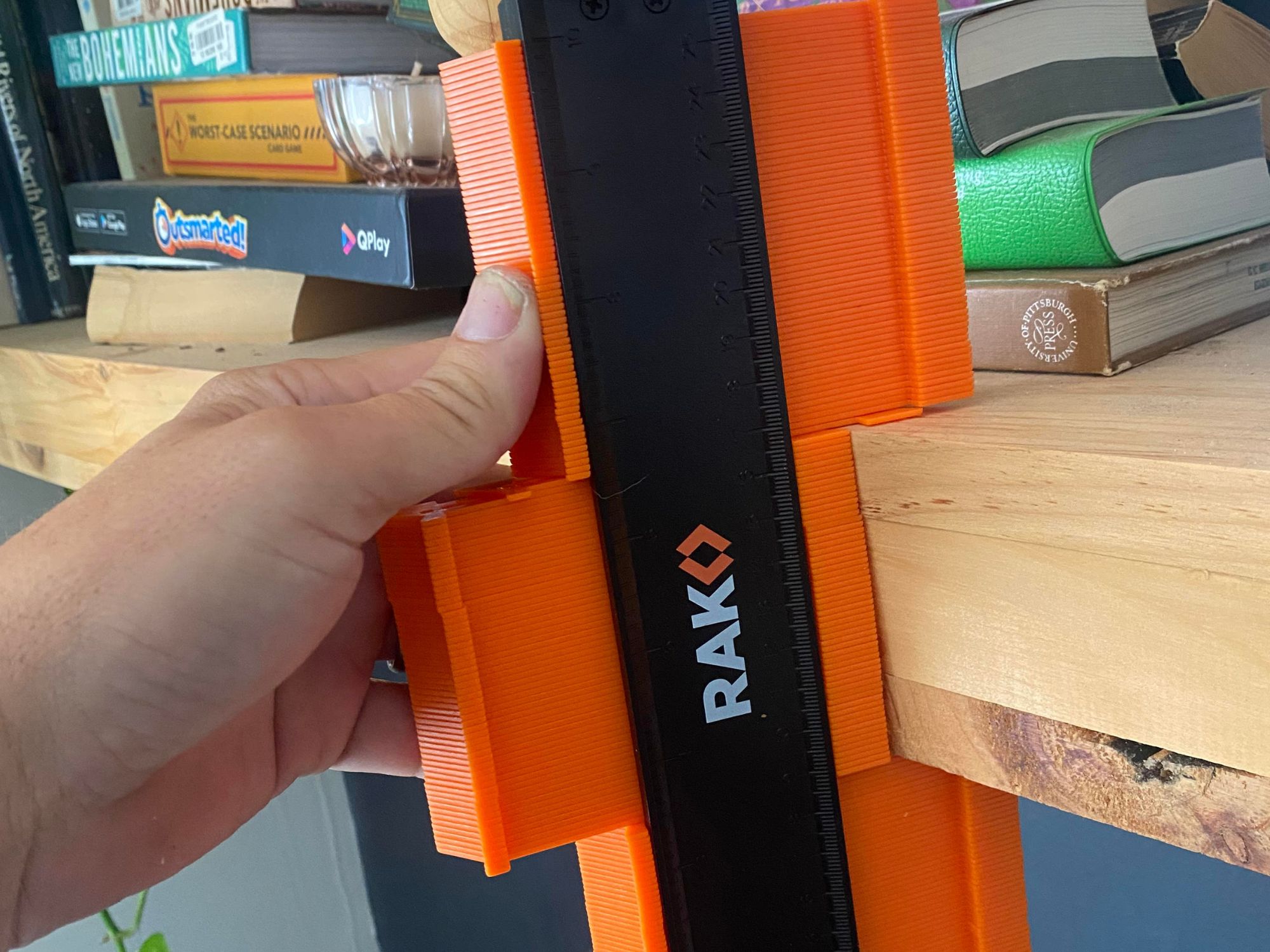
How We Chose and Tested the Best Contour Gauges
We used several criteria and extensive research to come up with our list of the top contour gauge tools on the market. Accuracy is key when using a contour gauge, so we chose models that use narrow pins to create more precise shapes than those with thicker pins.
A good contour gauge tool should also provide enough depth to handle a variety of jobs, so we stuck mainly with models that have a max contour depth of at least 2 inches. Length is also key, so we chose gauges that were at least 10 inches long. Our list includes single-gauge kits as well as those that come with short and long contour gauges, which offer greater versatility. All of the contour gauges we selected are made of either durable stainless steel or high-grade plastic with aluminum cores.
What to Consider When Choosing a Contour Gauge
When you’re choosing the best contour gauge for projects, consider size, resolution, pin depth, and durability. The following sections contain details about the features that shoppers will want to keep in mind when looking for a quality contour gauge.
Size
Size is a significant factor to consider when choosing a contour gauge. The larger the gauge, the longer the contour it can duplicate. Most contour gauges are 10 inches long, which is more than enough to cover typical door frames, trim, molding, and other common obstacles DIYers face when completing home-improvement projects or tackling a woodworking project. Smaller gauges also are available in 5-inch and 6-inch widths, which are useful for tighter spaces where a larger gauge may not fit.
Pin Depth and Material
Pay attention to pin material and depth when selecting the best contour gauge. Most gauges are about 4 inches wide, and that width includes the housing that holds the pins together. The actual pin depth, which is the maximum depth that the gauge can duplicate, is about 2.5 inches for a 4-inch gauge. That’s enough to trace most trim and molding. Wider 5-inch gauges, which have a pin depth of 3.5 inches, can contour materials with greater depth, such as a pipe that runs through the floor.
Pin material is either metal or plastic. Metal is more durable than plastic, which can break or wear out if users push the tool too hard against an object. However, metal contour gauges are not indestructible. Metal can bend if the tool is improperly stored or pressed against an object with too much force. The metal pins also can become loose from the housing if proper care is not taken. High-quality plastic pin gauges use a metal core to hold the pins in place.
Resolution
How accurately a counter gauge silhouettes an object depends largely on resolution. As with pixels, which determine the resolution of a TV or computer display, the more pins in a contour gauge, the more accurately it will duplicate the irregular shape. Contour gauges with smaller pins will match the object’s shape more accurately than larger pins.
Additional Features
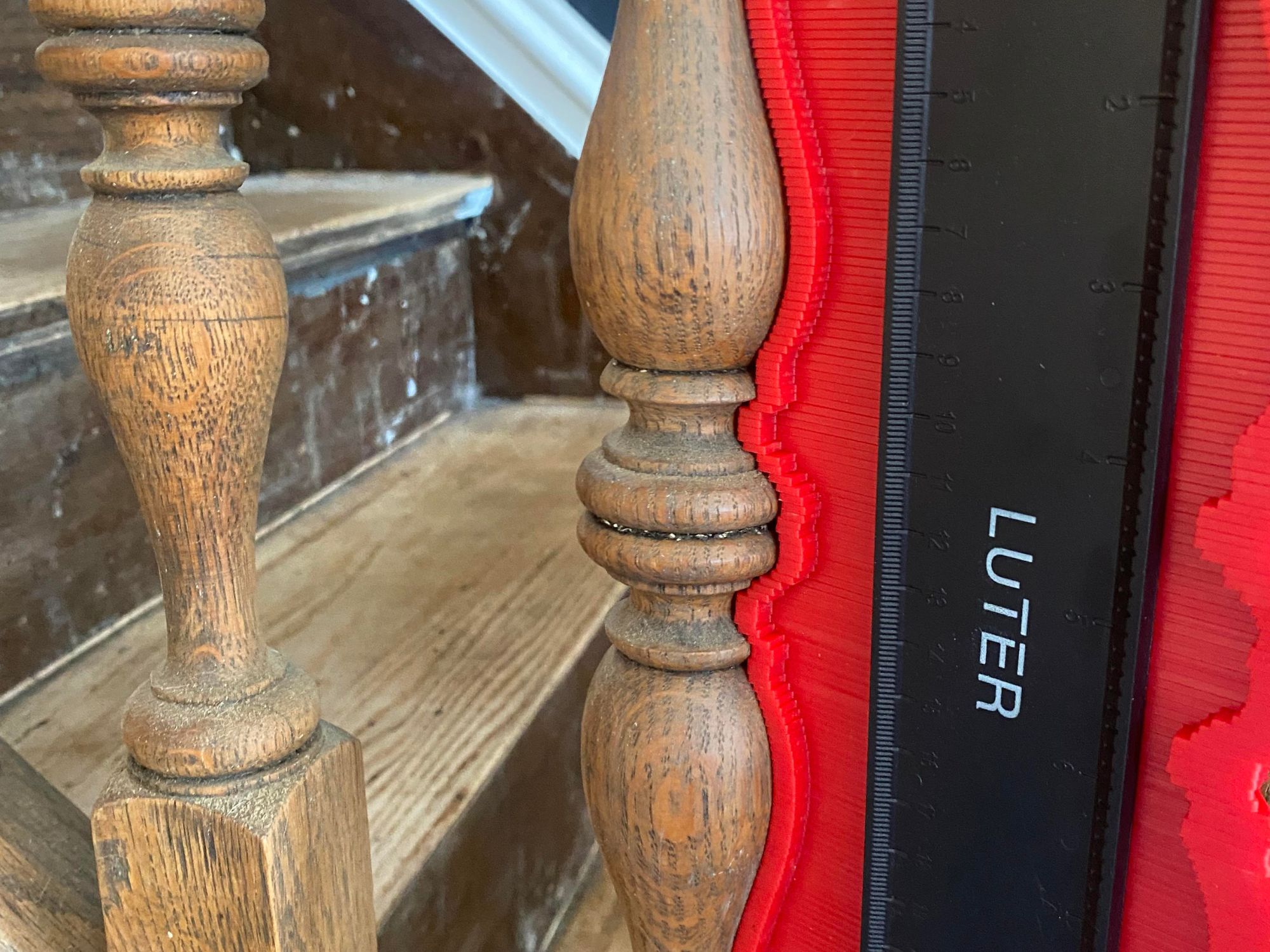
- Locking mechanism: The purpose of a contour gauge is to transfer the shape of an object as accurately as possible onto paper, wood, or another material. A mechanism that locks the pins in place makes tracing the shape much easier. Some contouring gauges have a locking clamp that firmly holds the pins in place, allowing users to trace the pattern onto wood, tile, or another material. After the contour gauge is clamped, it should be very difficult to dislodge the pins.
- Joinable parts: Most contour gauges have a maximum length of 10 inches. While that may be enough for most woodworking applications, it may not be long enough for every space. If users are employing a single gauge to contour a wide space, they’ll have to take repeated readings, making the process more tedious and increasing the likelihood of mistakes from accidental overlapping. Some gauges have parts that allow users to join multiple units together, allowing them to contour longer spaces accurately.
- Magnetic blocks: Some contour gauges feature edge magnets, enabling the gauge to stick to metal objects. The magnets can make it easier to apply and set the gauge when tracing metal. They also allow users to store the gauge conveniently against a metal surface, like in a workshop or on a truck, making it more simple to locate when needed.
- Adjustability: The more a contour gauge is used, the looser the pins will become. Shoppers will want to look for contour gauges that allow them to adjust the pins’ tension with two screws on either side. This enables users to loosen the pins if they are too tight and tighten them when they’re too loose to hold their shape.
Tips for Using a Contour Gauge
Although using a contour gauge is pretty simple, there are a few guidelines to follow to ensure you get the best results. Before taking a shape with a contour gauge, make sure to push the teeth against a flat surface to align them. Employ the hex adjusters on the contour gauge so there’s enough pressure on the teeth to hold the shape in place after you record it, but not so much pressure that you need to move the teeth forcefully when pressing them against a shape. Applying too much pressure can cause the teeth to bend, potentially damaging the tool. After taking a shape, make sure to lock the teeth in place with the locking mechanism (if there is one) to prevent the teeth from moving while transferring the shape.
- Press the contour tool against a flat surface to align the teeth just before using it.
- Use the hex adjuster to get the right amount of tension on the teeth.
- If possible, lock the teeth into place before transferring the shape.
FAQs
This section includes additional instructions on using contour gauges, along with some commonly asked questions and answers.
A contour gauge is an easy tool to use. There are four steps to follow.
1. First, align the pins by pushing the tool up against a flat surface.
2. Next, push the gauge evenly against the irregular shape to create a contour of it.
3. Then, if the gauge has a locking mechanism, engage the lock to hold the pins in place.
4. Last, transfer the gauge to the material and trace the shape. Then make your cut using a jigsaw, coping saw, or band saw.
Contour gauges with a locking feature typically have a small metal lever or switch on the end of the gauge. After you have used the gauge to create a contour, lock the pins in place by moving the switch to the locked position. Now you’re ready to trace the shape onto the material you are using.
Contour gauges can be used for many different kinds of shapes. However, you can only create the contour of one shape at a time. To create contours for longer shapes, you may need to use multiple gauges that hook together.
Since metal is stronger than plastic, metal contour gauges can have finer pins than plastic models. This means a metal contour gauge can take higher-resolution shapes than a plastic model. However, metal pins are more likely to scratch materials while taking measurements.
Contour gauges are primarily used to get accurate measurements of angles and shapes that would otherwise be difficult to measure. Instead of having to create a stencil or “eyeball” difficult angles, a contour gauge allows a user to create an exact replica of the shape and then trace it out.
In our testing, we found that gauges that had between 15 and 20 pins per inch gave us the best results.
For gauges that have pin-tension systems, the tension is adjusted by a screw either on the face of the gauge or on one of its ends.
Meet the Tester
Mike Larson is a professional journalist and DIYer in Pittsburgh. He’s become an experienced contour gauge user by replacing the floor in his living room and retiling his kitchen. As a product tester, he likes to use a method and criteria that reveals the value of the product as a whole in a way that helps other DIYers and craftspeople.
Additional research provided by Tony Carrick.
